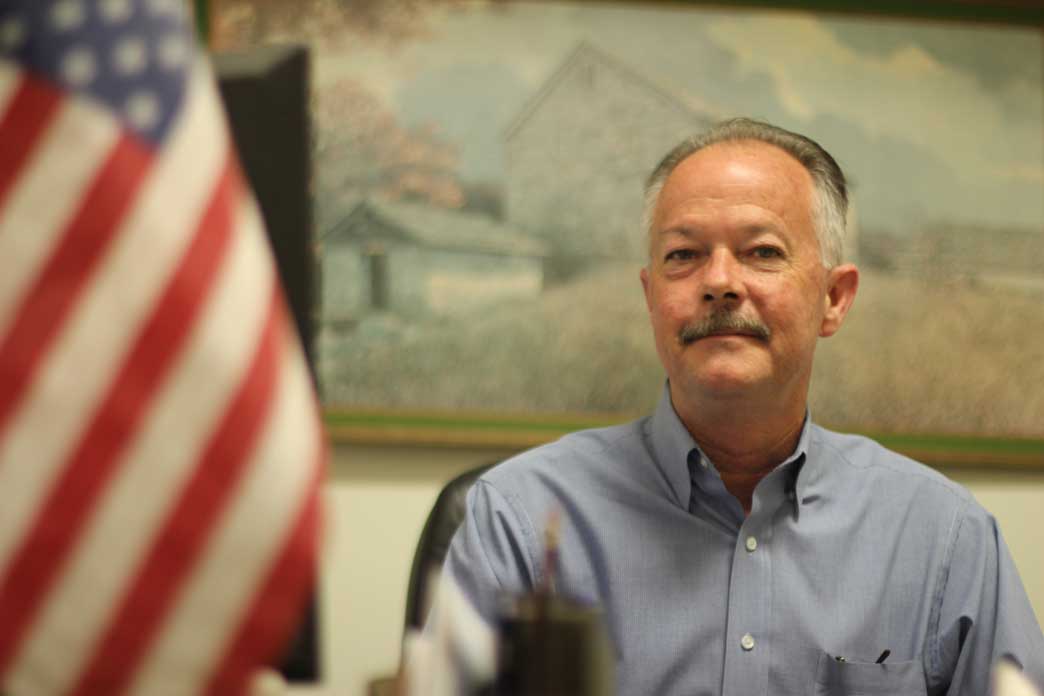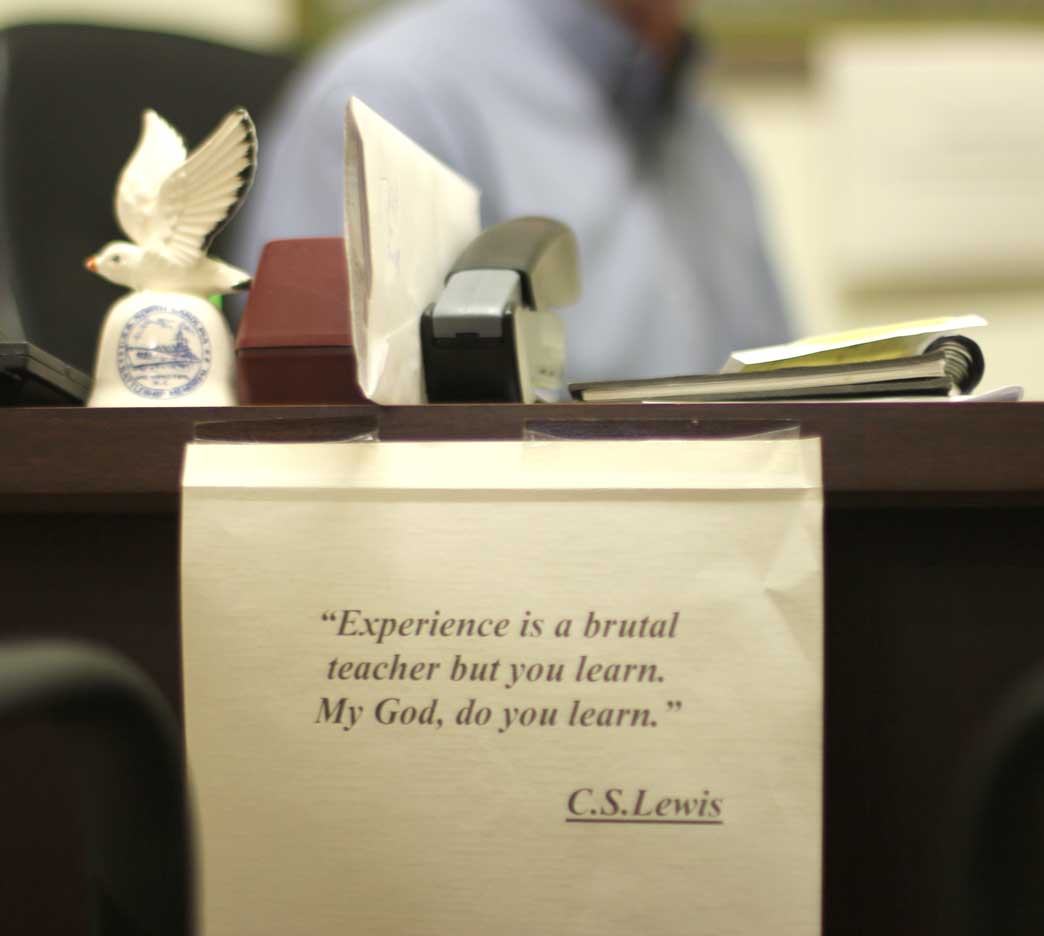Editor’s note: TROSA partners with the Department of Veterans Affairs to provide assistance to veterans in Durham. Two recipients are Herman Williams, a TROSA staff member, and William Touchstone, a current program participant.

Retired Master Chief Petty Officer of the Navy Herman Williams now works at TROSA in the aftercare department and with other veterans. He graduated from the program in 2009 after struggling with alcoholism for most of his life. (Staff photo by Caitlin Owens)
For at least 15 years, Herman Williams drank his breakfast in a yellow, 11-ounce tumbler.
He filled the tumbler three-quarters full with Jim Beam whiskey and added a splash of Sprite, “more to make myself feel better about drinking it,” he said. Once he rid himself of his morning shakes, he could make his coffee.
He then went about the rest of his day as Master Chief Petty Officer of the Navy Williams. He served for 23 years.
“By the time I reached my 23rd year, it’s like drinking was it,” he said. “That’s all I cared about from the time I got up until the time I went to bed or passed out because I was drunk.”
His drinking only worsened when he left the military. About a year and a half after retiring, Williams’ girlfriend kicked him out of his house in Jacksonville, Fla. He then found himself driving up the highway to North Carolina.
Shortly after that, he enrolled in Triangle Residential Options for Substance Abusers, Inc. (TROSA) in December 2007. He hasn’t left yet, even though he graduated after completing the two-year program. He now works in TROSA’s aftercare department and with veterans in the program. The organization’s motto is “Each one, teach one.”
“I know right now I am happy doing what I’m doing,” Williams said. “I’m happy seeing the change in others. I’m happy with the impact that I have on someone else’s life by talking to them about my experiences, especially the veterans.”
Founded in 1994, TROSA is a long-term, residential substance abuse program in Durham. TROSA partners with the Department of Veterans Affairs to provide services to veterans struggling with substance abuse. (See previous VOICE coverage of TROSA and veterans.)
TROSA is one of several community programs that partners with the VA to service veterans. The program offers an alternative to going through the VA to veterans seeking help for substance abuse.
“The VA cannot take care of everybody. That’s why programs like TROSA partner with the VA. We accept the overflow,” Williams said.
Choices
Like Williams, many veterans choose to participate in community programs like TROSA. Currently, 42 of its roughly 390 participants are veterans. Sometimes, he said, they give backlog in the VA office as their reason for choosing TROSA.
For substance abusers, the VA does not offer a long enough treatment program, Williams said.
“It takes a minimum of the first 12 months for you to become physically okay, mentally okay and emotionally okay,” he said. “You cannot go into any program that’s 30 days, 60 days, 90 days and, in most cases, even 12 months. It’s not going to correct the underlying causes of your addiction.”
The VA started awarding per diem funding for this reason, said Michelle Kucerak, TROSA’s director of development. The VA’s Grant and Per Diem Program funds community agencies providing services to homeless veterans.
Currently, 20 of the 42 veterans at TROSA qualify for VA funding.
Substance abuse is one of many issues with which veterans struggle. Other common problems include post-traumatic stress disorder, traumatic brain injury and muscular-skeletal issues, said Pete Tillman, public affairs officer at the Durham VA Medical Center. These issues are not unique to veterans.
“[Veterans] will struggle with the same things civilians will struggle with,” Tillman said.
Among males 18 and older, eight percent of veterans and 14.6 percent of nonveterans abuse or are dependent on alcohol or illicit drugs, according to the U.S. Department of Health and Human Services.
According to a National Institute on Drug Abuse report from 2008, 47 percent of active duty service members reported binge drinking. The report also stated alcohol use is higher among men and women in military service than among civilians.
According to the report, only 2.3 percent of military personnel said they used an illicit drug in the month prior to being surveyed, most likely a consequence of the Department of Defense’s zero-tolerance drug policy.
Williams blames only himself for the choices he made.
“I could easily try to say I became an alcoholic because of the Navy,” he said. “No, the Navy didn’t make me drink. I chose to drink. I chose to go to the places the sailors were hanging out drinking. I chose, when we pulled in port overseas, to go into the bar, spend the next four, five days drinking.”
Defining moments
Williams, now 50, grew up the child of two alcoholics. When he was eight years old, his father committed suicide. His mother then fell into a severe depression. Williams’s sister, Pamela, raised him and his younger brother.
“Growing up, I used to curse my father, wondering how he could do what he did and leave two small boys,” he said. “Low and behold, I turned out to be just like him.”

A C.S. Lewis quote hangs on Herman’s desk. He first heard the quote on an episode of Criminal Minds, and it stuck with him ever since. (Staff photo by Caitlin Owens)
Williams began drinking when he was 10 or 11, he said. At first, he didn’t make the association between his father’s alcoholism and what was, at the time, social drinking. He grew up in Rocky Mount, N.C., a small rural town where teenage drinking was the norm.
As he got older, Williams realized he was not a social drinker.
“I couldn’t sit there and ‘milk a beer,’ as they say,” he said. “I would sit there and guzzle the first four, five, six.”
He joined the Navy when he was 21. Drinking in the military was “socially acceptable and encouraged,” he said. Williams drank with his friends and, eventually, to relieve the stress associated with his high-ranking position.
“It’s not like the military doesn’t do anything to try to reduce it,” he said. “But at the same time, they don’t prevent it either. It’s always been that way since the beginning of time in the military.”
After a distinguished career, including 12 years on sea duty and participation in Operation Desert Storm, Williams retired at age 43. He lived in Jacksonville, Fla. with his girlfriend and her three kids, who he considers his own.
His alcoholism only worsened after he retired. One Friday afternoon, he came home to find his belongings thrown on the lawn in the pouring rain. Deborah, his girlfriend, had enough. She told him to leave and to not come back until he found help.
His sister, Pamela, recommended he come to North Carolina and give TROSA a try. He agreed.
“If it hadn’t been for my sister locating this place, I probably would have poisoned myself with alcohol. I probably would have been dead right now,” he said.
Nearly five years later, Williams and Deborah are still together. A defining moment for him was when he reunited with his grandson after nearly three years. Williams raised him from the time he was six weeks old until he was four.
“[He] can see his grandfather today and doesn’t smell alcohol, doesn’t see a bottle, doesn’t think of me any other way than grandpa,” he said.
Williams now finds fulfillment working for TROSA.
“I’m helping someone every day, whether it be a veteran or just someone in the program. That continues to define who I am as a person, who I am as a sailor and who I am as an alcoholic,” he said.
Leaving legacies

William Touchstone, a TROSA participant, works in the program’s intake department. “The legacy I want to leave is a guy who serves his humanity,” he said. (Staff photo by Caitlin Owens)
April 4, 1968, marked a turning point in the lives of many people across the nation, including William Touchstone. Touchstone, 58, is currently a member of TROSA’s program and, like Williams, a veteran.
Many recognize that date as the day civil rights hero Dr. Martin Luther King, Jr. was tragically assassinated. For Touchstone, this marked the beginning of a downward spiral and an over 40-year addiction to drugs and alcohol.
As buildings burned and chaos erupted, Touchstone and his friends broke into a beer distributor. Touchstone, in high school at the time, drank beer and wine for the first time in his life. He also started doing LSD and smoking weed.
He drank and did drugs almost every day afterward until coming to TROSA. “My addiction just snowballed from there,” he said.
Senior year of high school, Touchstone was caught with drugs and expelled. Over the next few years, a series of drug-related instances left him unwelcome in both his parents’ and his sister’s houses.
Touchstone then joined the U.S. Army. Before he entered the service, Touchstone married and had two daughters. A third was born while he served.
He served only two years before he was honorably discharged for a physical disability. He tripped over some beer bottles while playing basketball in the gym and severed a nerve in his right arm, paralyzing the lower half. He then left the Army and returned home to his family in Pennsylvania.
Substance abuse remained a defining part of Touchstone’s life, and he was “deep into selling drugs,” he said. Five years after leaving the Army, Touchstone dropped his youngest daughter, Tara, off at kindergarten. He then left his family for 17 years.
“She went in the door. I started going down the steps,” he said. “The door opened up and she said, ‘Daddy, you gonna be here to pick me up from school?’ I said, ‘Yeah baby girl, I’m gonna be here to pick you up from school.’ But I wasn’t there.”
Touchstone spent those 17 years homeless in Miami, Fla. He had multiple run-ins with the law, and about two years ago the police picked him up and interrogated him. The interrogation was filmed and, in a strange twist of fate, seen by one of his daughters.
Touchstone’s life then came to another turning point.
His family flew him to Durham 20 months ago, where they had relocated following his oldest daughter’s enrollment at UNC-Chapel Hill. They met him in the airport. After 17 years of separation, his youngest daughter grabbed him and said, “Daddy, I’ll never let you go.”
“Right then and there, when my baby girl grabbed me…I was ready,” Touchstone said. “I had something to really, really live for now.”
One of his other daughters, Tiffany, toured TROSA while attending North Carolina Central University. With his family’s encouragement, Touchstone soon began the program.
He now works in the intake office, focusing on helping others with experiences similar to his.
“It’s not what TROSA can do for me now. It’s what I can do for TROSA and my brothers and sisters who are caught in the grip of addiction,” he said.
Although his family’s healing process isn’t over, his wife and daughters have encouraged him throughout his time at TROSA. He receives letters from them two or three times a week.
“My family’s coming back, slowly but surely,” he said. “I’m not in a hurry.”
Touchstone sees his military experience as a positive influence. It taught him discipline and teamwork, which he now applies to his experience at TROSA.
“Where I come from, I was a combat engineer, and we believed in ‘leave no man behind.’ I carry that with me today,” he said.
Touchstone, like Williams, wants to use his experiences to help others, no matter what the cost.
He wants to leave a legacy. He no longer wants to be known as a drug dealer. Instead, he wants to be known as someone who serves humanity. At TROSA, he has an opportunity to create that legacy. He helps others as he continues his own healing process.
“I like to say we’re not bad people trying to get good,” he said. “We’re just sick people trying to get better.”
Veterans Crisis Line: 1-800-273-8255
For a printer-friendly version of this story, click here.
dorothy says:
This story does a great job of making the issue personal, especially the family aspect of both men’s stories. Also, the last quote from Williams is a great final thought.